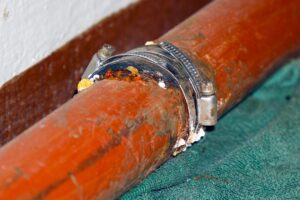
This article discusses what copper pinhole leaks are and the damage they can trigger if left untreated.
As a homeowner, keeping your house in excellent condition is a priority. Unfortunately, things happen that we cannot control or be ready for – sinks clog, water heaters break down, pipes burst. However, when it comes to pinhole leaks, a minor issue can become expensive. This article discusses what copper pinhole leaks are and the damage they can trigger if left untreated.
What are Copper Pinhole Leaks?
Copper pinhole leaks are minor leaks that drip and pool over time, no more significant than the head of a pin. Unfortunately, early detection is unlikely due to their size. In addition, a pinhole leak can be unseen for weeks or months, allowing the damage to develop while the cause remains unknown. Without an adequate assessment from a plumbing company, leaks of this type can severely damage your house and water system. As a result, you will get a costly bill for water damage.
Causes of Pinhole Leaks in Copper Pipes
Even though copper water pipes are regularly used due to their availability and reliability, copper tends to weaken and corrode. Multiple factors contribute to copper pinhole leaks and corrosion.
Rust
Copper doesn’t rust chemically, only iron. However, copper corrodes. Unlike rust, copper corrosion is progressive and slow. If you notice “rust” and are experiencing plumbing issues like low water pressure, you may have a pinhole leak.
Aging
What is great about copper is its durability. Well-maintained copper piping can last more than 50 years in residential plumbing, and in commercial systems, it’s double that amount. However, if your house or copper pipes are over 20 years old, your home might be experiencing copper pinhole leaks.
Internal Pitting Corrosion
Internal pitting corrosion is the primary cause of pinhole leaks. In this case, a leak might indicate a breaking point in which excess corrosion has eaten away the inside of the copper pipes. If left unchecked, leakage might occur.
Exposure
Because of its dissimilar chemical structures, copper can corrode when in contact with rebar. Similarly, soil and concrete might contribute to corrosion. Meanwhile, copper is not likely to react with concrete, but high levels of sulfur in some concrete mixtures can be too acidic for copper. Eventually, this leads to leaks and weakening.
Identifying Pinhole Leaks
If you suspect your home may be experiencing copper pinhole leaks, here is what you should look out for:
· Copper degrades slowly, so discoloration of copper indicates aging and reliability.
· Listen for the sound of dripping or running water when you turn off all the faucets. A leak might remain undetected until a plumbing professional can personally assess the piping.
· A minor leak can lead to mildew and mold. If a room in your home has received a damp smell, you may have a leak.
· Walls and flooring will likely get water damage, so monitor warping, peeling discoloration, and cracks.
MAKE W.H. WINEGAR & SON YOUR FIRST CHOICE!
If you’re seeking plumbing or heating repairs, replacements, or other solutions, look no further than W.H. Winegar & Son Plumbing and Heating! With decades worth of industry experience, our leading professionals are guaranteed to find incredible solutions to all your plumbing and heating problems. Now that you know us, let us get to know you! If you are curious about any of our business services, reach us by telephone at 301-384-5818 or fill out this contact form, and one of our representatives will contact you shortly. Make sure to follow us on Facebook and LinkedIn!